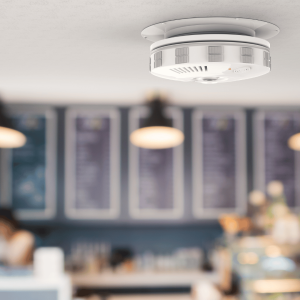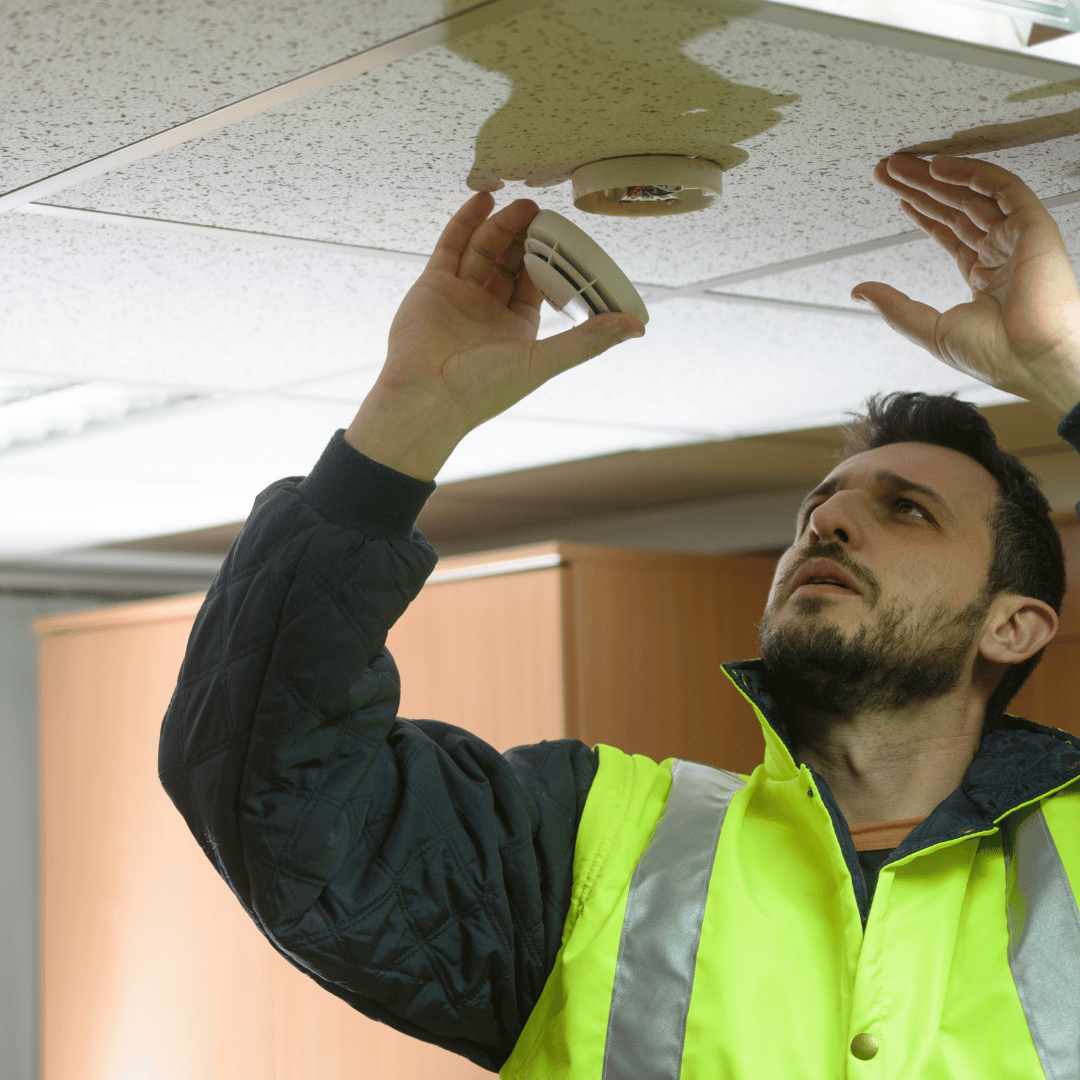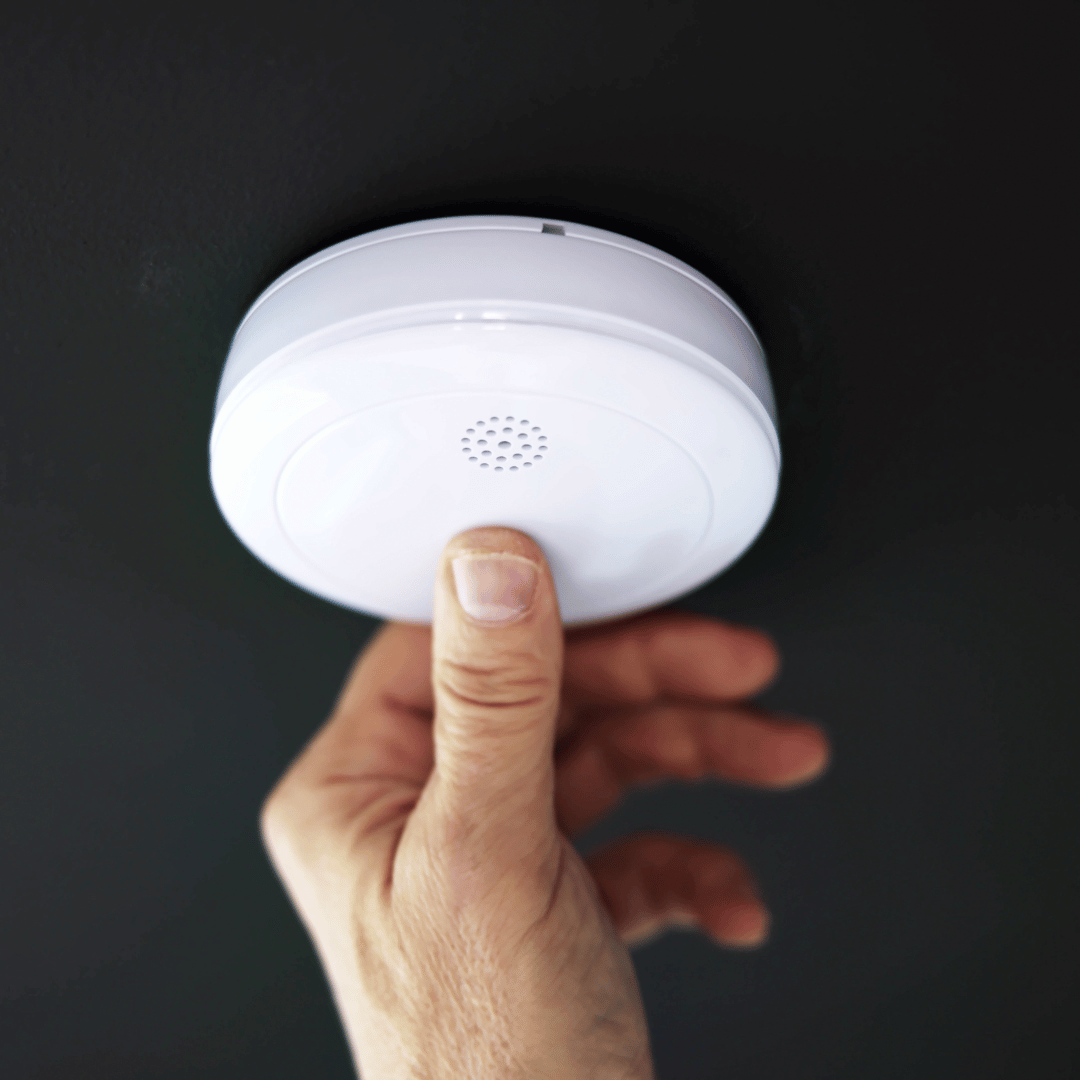
Lithium Battery Smoke Detectors: Benefits, Maintenance Tips, and Safety Insights
Smoke detectors are a critical component of home safety, providing early warnings that can save lives and protect property. Choosing the right power source for your smoke detector is just as important as installing one, and lithium battery smoke detectors have emerged as a popular choice for their reliability and longevity.
Lithium batteries are known for their extended lifespan and consistent performance, making them an excellent option for keeping your smoke detectors operational for years without frequent replacements. However, many homeowners have questions about their functionality, maintenance, and potential drawbacks.
At HomeSmiles, we understand the importance of keeping your home safe through comprehensive preventative home maintenance. From replacing smoke detector batteries to tackling essential tasks like Interior Home Maintenance, Exterior Home Maintenance, and Dryer Vent Cleaning, our 18-point service plan ensures all your maintenance needs are covered.
In this article, we’ll answer common questions about lithium battery smoke detectors, discuss their benefits and potential issues, and explain how they fit into a broader preventative home maintenance strategy.
Are Lithium Batteries OK for Smoke Detectors?
Yes, lithium batteries are not only okay for smoke detectors but are often highly recommended. They offer several advantages over traditional alkaline batteries, making them a preferred choice for many homeowners:
- Longer Lifespan: Lithium batteries can last up to 10 years, significantly reducing the need for frequent replacements. This aligns with the lifespan of many smoke detectors themselves, making them a set-it-and-forget-it solution.
- Reliable Performance: Lithium batteries maintain consistent power output, ensuring that your smoke detector remains operational even as the battery approaches the end of its life.
- Cost-Effectiveness: Although lithium batteries are more expensive upfront, their long lifespan offsets the cost of buying multiple alkaline batteries over the same period.
Lithium batteries are particularly beneficial in hard-to-reach smoke detectors, such as those mounted on high ceilings, because they minimize the need for frequent maintenance.
Including lithium battery smoke detectors as part of a comprehensive Interior Home Maintenance routine ensures that your home remains safe and your detectors stay functional. At HomeSmiles, we emphasize preventative home maintenance to address safety concerns like these before they become issues.
Why is My Smoke Detector Chirping with a Lithium Battery?
If your smoke detector is chirping even though it has a lithium battery, it’s a common issue that can have several causes. Understanding why this happens can help you troubleshoot and resolve the problem quickly. Here are the most common reasons for a chirping smoke detector with a lithium battery:
- Low Battery: Despite the long lifespan of lithium batteries, they do eventually run out of power. If your smoke detector starts chirping, it could be signaling that the battery is nearing the end of its life. In many cases, a lithium battery should last up to 10 years, but it’s always good to check the battery’s expiration date.
- Loose or Improperly Installed Battery: If the battery isn’t properly seated in the smoke detector, it can cause intermittent chirping. Double-check that the battery is correctly installed and securely in place.
- Dust or Debris: Smoke detectors can also chirp if there’s dust, dirt, or cobwebs obstructing the sensor. Cleaning your smoke detector regularly can help avoid this issue. Use a vacuum or a soft brush to gently remove any debris.
- Malfunctioning Smoke Detector: If your smoke detector is old or defective, it may chirp as an indication that it’s no longer working properly. In this case, replacing the entire unit may be necessary.
- Environmental Factors: Changes in temperature or humidity can sometimes cause a smoke detector to chirp. Ensure that the smoke detector is installed in a place with a stable environment.
Addressing a chirping smoke detector promptly is essential for maintaining the safety of your home. As part of your Preventative Home Maintenance routine, it’s wise to inspect your smoke detectors regularly and perform simple maintenance tasks, such as cleaning the sensor and replacing the battery when necessary. HomeSmiles can help you stay on top of these tasks to ensure the safety and functionality of your home’s systems.
Why is My Lithium Battery Smoke Detector Going Off?
If your lithium battery smoke detector is going off unexpectedly, it can be both alarming and frustrating. There are several potential reasons for false alarms or triggers, and understanding these can help you resolve the issue quickly:
- Smoke or Fire: The most obvious cause of an alarm is the detection of smoke or fire. Even if you don’t see visible flames, the detector might be reacting to smoke from cooking, a nearby fireplace, or other sources. In such cases, the alarm is doing its job to protect your home and alert you to potential danger.
- Humidity or Steam: Excessive humidity or steam can trigger the alarm, especially in areas like kitchens, bathrooms, or laundry rooms. Make sure your smoke detector is installed away from areas prone to high moisture levels. If steam or humidity is suspected, use a dehumidifier or ventilation to reduce the moisture in the air.
- Dust or Debris: Smoke detectors are sensitive to particulate matter, including dust and debris. If there’s a lot of dust buildup around your detector, it can cause false alarms. Regular cleaning of your smoke detectors is essential to prevent this issue. Use a vacuum or a soft brush to gently clean the device.
- Carbon Monoxide: Some smoke detectors are integrated with carbon monoxide sensors. If there’s a buildup of carbon monoxide in your home, the detector may go off as a precautionary measure. Make sure your home has proper ventilation, and if you suspect carbon monoxide, immediately evacuate and call emergency services.
- Battery Issues: A failing battery, even in a lithium-powered smoke detector, can sometimes cause the detector to behave erratically. If your smoke detector is going off without any clear reason, it may be worth replacing the battery, even if it’s still relatively new.
- Electrical Interference: In some cases, electrical issues, like a surge or power fluctuation, may cause the smoke detector to malfunction. If you have a hardwired smoke detector with a lithium battery backup, check for any signs of electrical problems in your home.
To prevent these types of issues, include smoke detector checks as part of your Interior Home Maintenance and Preventative Home Maintenance plan. Regularly inspect your smoke detectors, clean them, and replace the batteries when needed. HomeSmiles can help with these tasks, ensuring your smoke detectors—and your entire home—stay safe and well-maintained.
How Long Do Lithium Smoke Alarm Batteries Last?
One of the key benefits of using lithium batteries in smoke detectors is their impressive lifespan. On average, lithium batteries in smoke detectors can last anywhere from 5 to 10 years, depending on the model and brand of the detector. This extended lifespan is significantly longer than the typical 1 to 2 years you can expect from standard alkaline batteries.
Why Do Lithium Batteries Last So Long?
- Consistent Power Output: Lithium batteries provide a steady and reliable power output over time, ensuring your smoke detector operates effectively without the need for frequent changes.
- Low Self-Discharge Rate: Lithium batteries have a very low self-discharge rate, meaning they lose less power when not in use, allowing them to maintain charge longer.
- Higher Capacity: Lithium batteries generally have a higher energy capacity compared to alkaline batteries, which means they can power devices like smoke detectors for an extended period.
When Should You Replace the Battery?
While lithium batteries last much longer than traditional batteries, it’s still essential to check their expiration date. Many smoke detectors equipped with lithium batteries have a built-in indicator to alert homeowners when the battery is near the end of its life. Typically, this alert will sound several weeks before the battery expires.
Even though the battery may last up to 10 years, it’s wise to follow a regular maintenance schedule for your smoke detectors, especially as part of Preventative Home Maintenance. This ensures that all your safety equipment is functioning correctly and that you’re not caught off guard by a battery failure.
At HomeSmiles, we help homeowners stay on top of their Interior Home Maintenance needs, including checking and replacing smoke detector batteries as part of our extensive service offerings. Regular maintenance ensures that your home remains safe and your smoke detectors are always ready in case of an emergency.
What is the Best Battery for a Hardwired Smoke Detector?
When it comes to hardwired smoke detectors, the primary power source is typically your home’s electrical system, but these detectors often include a backup battery to ensure they function during a power outage. While many hardwired smoke detectors come with a standard 9-volt or alkaline battery, many homeowners are now opting for lithium batteries as the backup choice due to their superior performance and longevity.
Why Choose Lithium Batteries for Hardwired Smoke Detectors?
- Longer Battery Life: As mentioned earlier, lithium batteries can last up to 10 years, which is much longer than the typical 1-2 years of an alkaline battery. This means you won’t need to replace the backup battery as frequently, which is especially convenient for hard-to-reach detectors.
- Stable Power Supply: Lithium batteries provide a steady, reliable power output throughout their life. This is important for hardwired detectors, ensuring that the battery backup kicks in when needed, without the risk of the battery fading unexpectedly.
- Cost-Effectiveness: Though lithium batteries may cost more upfront, their long lifespan means you’ll spend less on replacements over time, ultimately making them a more cost-effective option in the long run.
Can You Use Other Batteries in a Hardwired Smoke Detector?
While alkaline batteries can be used as a backup in hardwired smoke detectors, they tend to drain more quickly, requiring frequent replacements. This can be a hassle, especially if the smoke detector is mounted in a high or difficult-to-reach area. As part of your Interior Home Maintenance, it’s a good idea to upgrade to lithium batteries for improved reliability.
When performing regular home maintenance checks, ensure that your hardwired smoke detectors are functioning correctly by testing the backup battery and replacing it as needed. This is a crucial part of Preventative Home Maintenance, as a properly maintained smoke detector can be a lifesaver in an emergency. HomeSmiles can help you stay on top of your smoke detector maintenance to ensure your home remains safe and secure.
How Bad is Lithium Battery Smoke?
While lithium batteries are a popular and reliable power source for smoke detectors, it’s important to understand the potential risks associated with lithium battery failures, particularly in the event of overheating or fire. In rare instances, lithium batteries can catch fire or explode, releasing smoke that may be harmful. Here’s what you need to know about lithium battery smoke and how to minimize the risks:
What Happens if a Lithium Battery Fails?
If a lithium battery is damaged, overcharged, or exposed to extreme heat, it can enter a state known as thermal runaway. This can cause the battery to overheat and potentially catch fire or explode, releasing smoke. The smoke produced by burning lithium batteries is toxic and may cause respiratory issues or other health problems if inhaled.
How Bad is the Smoke?
- Toxic Fumes: Lithium-ion batteries, when overheated or damaged, can release harmful chemicals, including hydrofluoric acid, which can be dangerous to breathe in.
- Health Risks: Inhaling the smoke from a lithium battery fire can cause irritation to the eyes, nose, and throat, and prolonged exposure may lead to more serious health complications.
How to Prevent Lithium Battery Fires and Smoke?
While the risk of a lithium battery smoke detector catching fire is extremely low, there are a few precautions you can take to ensure safety:
- Use Quality Batteries: Always use high-quality, manufacturer-recommended lithium batteries for your smoke detectors. Avoid cheap, off-brand batteries, as they may be more prone to failure.
- Check for Damage: Regularly inspect your smoke detectors for signs of damage, wear, or corrosion, especially around the battery compartment.
- Proper Installation: Ensure that your smoke detectors are installed according to the manufacturer’s instructions, and avoid placing them in areas with extreme heat or moisture that could affect the battery’s performance.
- Replace Expired Batteries: Even though lithium batteries have a long lifespan, they should still be replaced when they reach their expiration date to avoid potential risks.
As part of your Preventative Home Maintenance, it’s essential to regularly check and maintain your smoke detectors to ensure they remain safe and functional. HomeSmiles can help you with this process, providing peace of mind by ensuring your home is equipped with working smoke detectors and other essential safety features. Regular maintenance minimizes risks and keeps your home safe from fire hazards.
Lithium battery smoke detectors are a great choice for homeowners seeking reliability, longevity, and minimal maintenance. Their long-lasting power, stable performance, and ability to work seamlessly as part of a hardwired smoke detector system make them an excellent option for ensuring the safety of your home and family.
While lithium battery smoke detectors provide many benefits, it’s important to stay proactive with regular maintenance. Keep an eye on potential issues like false alarms, low battery warnings, or any signs of malfunction. By addressing these concerns early, you can avoid costly repairs or replacements down the line.
As part of a comprehensive Preventative Home Maintenance routine, maintaining smoke detectors is just one of the essential tasks that HomeSmiles handles for homeowners. From Interior Home Maintenance like Dryer Vent Cleaning and Window Washing to Exterior Home Maintenance tasks such as Gutter Cleaning and Pressure Washing, our 18-point service plan ensures your home stays in top shape.
Incorporating these simple maintenance tips into your regular home care routine will not only keep your smoke detectors working efficiently but also ensure the overall safety of your home. At HomeSmiles San Mateo, we’re here to help you with all your home maintenance needs, so you can enjoy peace of mind knowing your home is in good hands.
Ready to Keep Your Home Safe and Well-Maintained?
Contact HomeSmiles San Mateo today to schedule your comprehensive home maintenance service! Let us help you with everything from smoke detector checks to Preventative Home Maintenance, ensuring your home remains safe, efficient, and problem-free year-round. Call us now or request a quote online to get started!
- Protecting Your Property: Why the Right Cleaning Method Makes All the Difference
- The #1 Thing That’s Dulling Your Curb Appeal (And How to Fix It)
- How Maintenance Bundles Provide Peace of Mind for Busy Small Business Owners and Facility Managers
- Essential vs. Complete Home Packages: Choosing the Right Preventive Care for Your Property
- How a Simplified Service Model Benefits Both Homeowners and Franchisees Alike


